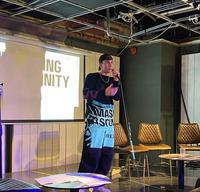We broke the silence around men’s mental health last week with our innovative and ground-breaking event, Unmasking Masculinity: Exploring Men’s Mental Health and Vulnerability, in partnership with Dad La Soul and AudioActive.
On a bitterly cold Thursday night, 70-odd people gathered in AudioActive’s central Worthing studio for an evening of lively debate and music broadly themed around two central questions: why don’t men seek help when they are struggling with their mental health and what can we do about it?
Two panel debates, four amazing rap performances and oodles of audience participation later – and the evening yielded engaging and much-needed conversations, exploring why men struggle to be open about their feelings, what kinds of support might appeal to men specifically and how wider society (parents, teachers, youth workers, politicians, communities) can be part of the solution.
As Dad La Soul founder, Dan Flanagan, said: “Men’s mental health and masculinity is everyone’s business”. And it really is, given that suicide is the leading cause of death for men under 45 in the UK. It’s a devastating statistic, but it speaks volumes of the deeply entrenched models of masculinity in our society that lead men to shy away from seeking help and suffer in silence – sometimes with devastating consequences.
The event opened with a performance by young rapper and AudioActive artist, Roscoe, and a thoughtful introduction from AudioActive CEO, Adam Joolia, who reflected on how the organisation’s Room to Rant music and lyric sessions for young men had literally saved lives by creating safe spaces to talk.

